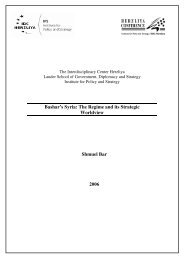Iran: Cultural Values, Self images and Negotiation Behavior
Iran: Cultural Values, Self images and Negotiation Behavior
Iran: Cultural Values, Self images and Negotiation Behavior
You also want an ePaper? Increase the reach of your titles
YUMPU automatically turns print PDFs into web optimized ePapers that Google loves.
Summary<strong>Iran</strong>ian negotiating culture is deeply rooted in the <strong>Iran</strong>ian national psyche,linguistic conventions, cultural mores <strong>and</strong> habits, <strong>and</strong> religious conventions. The highvalue that <strong>Iran</strong>ians place on cleverness <strong>and</strong> on their ability to outwit their counterparts,<strong>and</strong> the social <strong>and</strong> religious legitimacy of dissimulation guarantee that almost anyexchange with <strong>Iran</strong>ians will be extremely opaque. Equally, the <strong>Iran</strong>ian negotiator willrarely accept a Westerner at face value; culturally ingrained mistrust, a general beliefin conspiracies, <strong>and</strong> the specific suspicion towards the West will most likely makehim believe that what seems like frankness <strong>and</strong> a c<strong>and</strong>id approach on the part of hisinterlocutor is but clever deception. The hostility of the present regime in <strong>Iran</strong> to theWest accentuates this tendency.<strong>Iran</strong>ians negotiators have frequently used blatant threats – many of them empty –as staple instruments in the course of negotiations, though they have also proven to besusceptible to use of threats by others. Cases of effective negotiations with <strong>Iran</strong>ianshave shown that more has been achieved by taking advantage of inherent <strong>Iran</strong>ian fears<strong>and</strong> weaknesses <strong>and</strong> wielding a credible “big stick,” thus bringing into play <strong>Iran</strong>ianpragmatism <strong>and</strong> the Shiite principle of the predominance of public interest. Once it isclear to the <strong>Iran</strong>ians that only compromise can avert a serious threat, the compromisewill become a legitimate choice. Ambiguity in threats may not achieve this end sincethe <strong>Iran</strong>ian side may assume that the other side is using tactics similar to its own.An analysis of the <strong>Iran</strong>ian tendency towards mistrust <strong>and</strong> conspiracy theoriessuggests that arguments in the course of negotiations should be based on clear shorttermincentives <strong>and</strong> threats, <strong>and</strong> not on incremental long-term confidence building.Progress will not be made through discussions of the rights <strong>and</strong> wrongs of each side'sview of the issues. <strong>Iran</strong>ian political dynamics will not allow a concession on the basisof the justice of a position. <strong>Negotiation</strong>s must achieve an acceptance by the <strong>Iran</strong>ianside of the brute facts, rather than an underst<strong>and</strong>ing of the merits of the other side.Only if it is clear beyond any shadow of doubt that the maslahat (interest) of theregime is at stake will this mechanism come into play. Despite the <strong>Iran</strong>ian tendency touse back channels to transmit such messages, it seems that <strong>Iran</strong>ians have frequentlyseen back channels <strong>and</strong> secret negotiations as giving the other side an advantage.Western negotiators have an inclination to try to nail down budding underst<strong>and</strong>ingsin writing in order to preclude retraction of the underst<strong>and</strong>ings. Since the <strong>Iran</strong>ianleadership has total authority, a Western negotiator can dem<strong>and</strong> immediate decisions<strong>and</strong> compliance, taking into account the <strong>Iran</strong>ian disposition towards post-negotiations.Written agreements have more or less the same status as oral ones; they are subject toreview when the circumstances that prompted them have changed.45
















